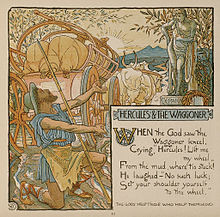Help yourself, God will help you
Help yourself, this is how God helps you is a proverbial invitation to take the initiative into your own hands and not leave it to anyone else. She warns against relying too much on gods, higher powers or other people in dealing with life.
The origins of this idea can already be found in the ancient phrase Σὺν Ἀθηνᾷ καὶ χεῖρα κίνει ( Syn Athena kai cheira kinei. "With Athena and move your hands!"), Which , in addition to prayer, prompts you to stir your own hands in times of need.
This is made clear by the fable poet Aesop (around 600 BC), for example in the fable “The ox driver and Hercules”, when the ox driver stuck in the morass does nothing but beg the gods for help, whereupon Hercules finally appears to him with the words : “Put your hands on the wheels and drive your team with the whip, but only beg the gods when you have done something yourself; otherwise you will call them in vain. "
This notion is echoed in the Latin sentence Fortes fortuna adiuvat ("Fortuna is helpful to the brave.") By the Roman authors Terence (185 / 195–159 BC) and Cicero (106–43 BC )
The New Testament addresses this idea in a peculiar form. In the tradition of the temptation of Jesus in the desert ( Mt 4,1-11 EU ), the devil opposes Jesus, who is starving because of fasting, with the request that he should help himself by making bread from stones. As the Son of God, this possibility of self-help of this kind is open to him, and God will guarantee him help just as in the case of the second temptation of invulnerability. Jesus rejects this connection between self-help and God's help here at the beginning of his earthly ministry as well as at his end on the cross, where the mockery of the crowd and the hierarchs culminates in the sentence: “He has helped others, he cannot help himself. "(( Mk 15.31 EU ) parr)
In Islamic tradition, the Prophet replied to the question of the connection between trusting in God and one's own actions: "Should I tie my camel and trust or not tie and trust?" With "Tie it up and trust (in Allah)!"
In German, the phrase is first found in the Baroque poet Justus Georg Schottelius (1612–1676): "Man, help yourself, God will help."
With Schiller's phrase in Wilhelm Tell “God helps the brave”, Gertrud Stauffacher calls on her husband Werner to resist the tyranny of the imperial bailiffs.
Gottfried Keller (1819-1890) brings the troop of seven upright with the salutation of Fähndrich the intuition of Swiss reformed Confederates in rather humorous manner, on an ironic denominator: "... whenever the country is in danger, they begin to very gently, in God to believe; first each quietly for himself, then louder and louder, until one betrays himself to the other and they then practice a strange theology together, the first and only main principle of which is: Help yourself, God will help you! "
The phrase is established in numerous languages, for example a society of legal resistance founded in 1824 after Charles X took office in France to protect the constitution against absolutist aspirations called itself Aide-toi, le ciel t'aidera (French, "Help yourself , Heaven will help you ”).
Accordingly, a Russian proverb reads “На бога надейся, а сам не плошай.” (“ Na bóga nádejsja, a sam ne plosháj ”. “Trust in God, but trust in yourself [to trust] is not worse”).
Currently, a trend toward consistent and rained off shows Atheist -turned version of turn about in book titles like Help yourself, otherwise it does not , Help yourself, otherwise you will help any: The art of living happily or cancer - Help yourself , otherwise nobody will help you (2001).
See also
Individual evidence
- ↑ versalia.de
- ↑ Trust in Allah (At-Tawakkul). Archived from the original on March 22, 2019 ; accessed on October 22, 2019 .
- ↑ duden.de
- ^ Friedrich Schiller: Complete Works , Volume 2. Munich 1962, 1st act 2nd scene FS. 923-929
- ↑ Gottfried Keller: Complete Works in Eight Volumes , Volume 7. Berlin 1958–1961, pp. 241–312
- ↑ Russian proverbs on Wikiquote
